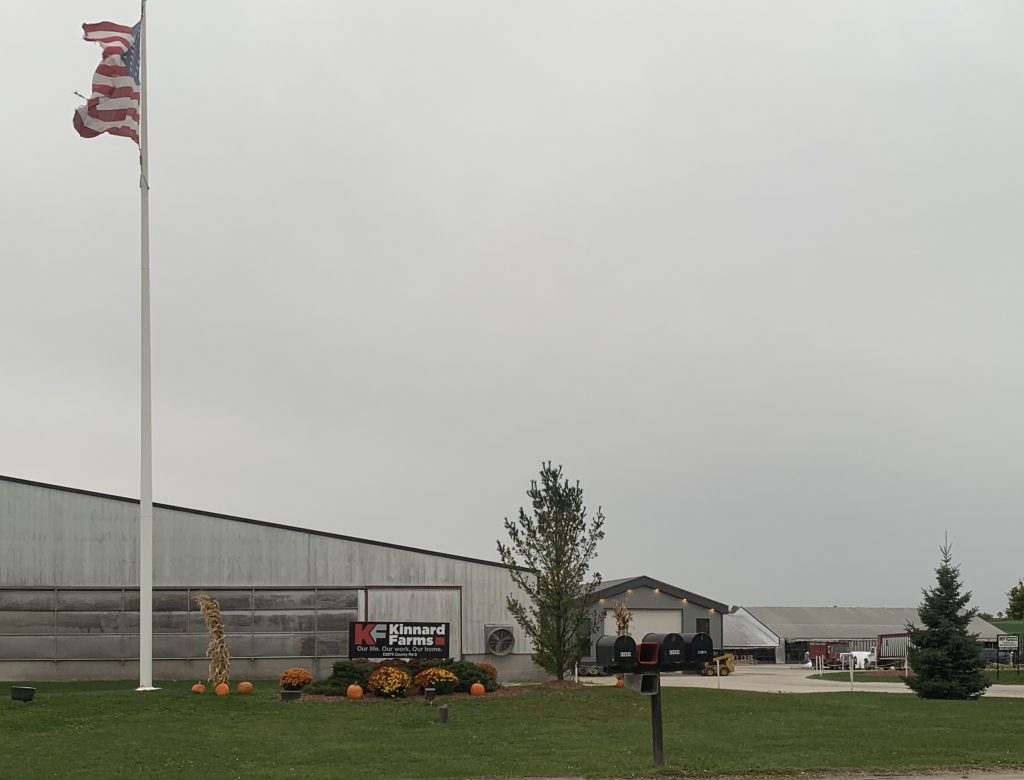
With Door and Kewaunee counties being home to the largest coastline in the state, heavy eco-tourism revenue and a high number of factory farms, environmental issues are again at the forefront of the District 1 Assembly race. Candidates Kim Delorit Jensen and incumbent Joel Kitchens have different approaches when it comes to the environment and how to conserve and protect it.
The district encompasses Door and Kewaunee Counties, as well as portions of Brown and Manitowoc Counties. Kitchens, R-Sturgeon Bay, has been in office since 2015. Jensen, D-Egg Harbor, is the owner of Mojo Enterprises, a group of restaurants and a bakery in Egg Harbor and Fish Creek.
Jensen’s platform focuses more on climate change and what can be done at the state level to lessen the human causes of it. Jensen said she has a niece who experienced the destructive derecho that unleashed winds of more than 100 mph in Cedar Rapids, Iowa, in August, which she attributes to the changing climate.
“Climate change is real,” Jensen said. “I just don’t know how you can deny science. … We see that our earth is warming, we see the fires, we see what happened in Cedar Rapids. Big weather events are going to happen.”
Jensen said that being a business person, she understands there are environmental costs to doing business.
“And I don’t always like that it costs me money,” Jensen said. “But when it comes to our environment, we have got to figure out a way to protect it.”
Kitchens also believes in climate change and believes human activity causes a big portion of it. He said answering the question of what can be done is the challenge.
“I think that there are opportunities with sort of renewable energy that we can be a winner for everyone,” Kitchens said. “I think there are some economic opportunities there and we need to pursue those.”
Kitchens talked about how Kinnard Farms in Casco partnered with Kewaunee Renewables to run the manure from its 8,000-plus cow farm through digesters so methane gas can be captured. According to its website, Kinnard Farms will produce enough renewable natural gas each year to power one-third of all of the households in Kewaunee County.
“Right now, we can sell that,” Kitchens said. “California has a subsidy for (that). … It’s cost effective to invest in digesters like that. I think that that is going to be a part of the solution down the line.”
Kitchens said he’s interested in the possibility of community manure digesters, so that smaller farms that cannot afford to build their own digesters have the same capabilities.
Jensen said she also was open to finding renewable energy alternatives, but emphasized that large corporations need to be held accountable for polluting.
“Just because you’re a big industry, doesn’t mean you can lobby to rewrite laws to favor you,” Jensen said. “We have to make sure that we’re writing bills to make sure that we’re protecting our resources.”
CAFOs
Wisconsin’s agricultural practices have become a risk factor in the quality of the water by way of water overuse, soil erosion, chemicals and livestock manure, especially in recent years.
Manure from CAFOs, or concentrated animal feeding operations, in particular has become an issue at about 300 of Wisconsin’s largest livestock farms.
In 2017, research by U.S. Department of Agriculture microbiologist Mark Borchardt found more than 60 percent of wells sampled in Kewaunee County were contaminated with fecal microbes, which can come from septic systems or animal waste. In a newer study conducted last year, Borchardt found the number one risk factor for contamination was the proximity of a well to a manure storage pit.
Kitchens has introduced several bills in the legislature regarding water quality during his six years in office. He said his philosophy in cleaning up drinking water is to involve farmers in the solution.
“So many times, the conservation community, they just think we can solve it by making tougher and tougher regulations,” Kitchens said. “It just doesn’t work, and it’s a real burden on agriculture.”
Kitchens, along with State Sen.Rob Cowles, R-Green Bay, proposed a bill in May 2019 for nutrient credit trading that would allow businesses and municipalities that need to reduce phosphorus and nitrogen discharges into ground and surface water to buy nutrient credits through a clearinghouse. It passed unanimously in the Senate and was signed by Gov. Tony Evers in March.
The clearinghouse bill was one of 13 bills introduced as part of a bipartisan legislative task force created by Assembly Speaker Robin Vos, R-Rochester, that held hearings across the state last year. Democrats said three of the bills didn’t do enough to protect water resources.
The final bill in the package—which would change how the state handles municipal flood-control grants—passed in the Assembly on a vote of 60-37, with Kitchens siding with Democrats in voting against the bill, arguing it would make it more difficult for some communities to obtain state money after experiencing flooding. The Wisconsin Department of Natural Resources (DNR) also testified against the bill.
In early April the state Senate struck down a bill by Kitchens that would create a nitrogen optimization pilot program in which the Department of Agriculture, Trade and Consumer Protection would award grants to farmers or producer-led watershed groups in targeted areas for the purpose of implementing projects that limit nitrogen loading, thereby reducing nitrates in drinking water.
While both candidates agree that the causes for water pollution have become a concern, Jensen said she disagrees with Kitchens on how to approach farmers, especially CAFO operators, in addressing water quality issues.
Jensen has criticized Kitchens for not being more strict with regard to large farms that have affected water quality.
“When it comes to polluting, we just cannot accept that it’s going to be a consequence of large farming,” Jensen said. “We have to fund the DNR so that scientists are helping us, not lobbyists and big corporations.”
Jensen said big farming is affecting small farming, and she would like to introduce a tax credit for people who want to sell land to small farmers.
“I don’t think small farms are going out of business because it’s too much work and they can’t do it anymore,” she said. “It’s because they can’t make money.”
Kitchens expressed skepticism about regulating big farms.
“We are never going to go back to that (small farming), because of the economies of scale,” Kitchens said. “When a tractor costs you $100,000, how’s a small farmer going to make money doing that?”
Other water quality concerns: PAHs and PFAs
A decade ago, Dane County banned the sale and use of coal-tar sealants with high levels of a potentially cancer-causing chemical compound, polycyclic aromatic hydrocarbons, also called PAHs. Two years ago, Milwaukee followed suit. The sealant is a liquid sprayed on parking lots, driveways and playgrounds. It often runs off into waterways through wastewater or industrial discharges, and natural runoff.
Kitchens introduced a bill in February that would prohibit the sale and use of these coal tar-based sealants and high PAH sealant products, but it failed in the Senate.
Jensen said she always is looking for opportunities for innovation to create better and safer products.
“It’s never wrong to look for better solutions,” Jensen said. “It just makes us more creative, and that’s what makes us Americans, I think.”
PFAS (per- and polyfluoroalkyl substances), which are human-made chemicals found in many everyday products, including nonstick pans, cleaning products, paints, and firefighting foam, also are an issue in the election because of their negative effects on water quality.
Kitchens introduced a bill in February that would create a municipal grant program for testing for PFAS and authorizes and funds several positions and activities relating to PFAS.
Jensen said as with anything that is toxic to the environment, a light has to be shone on it.
